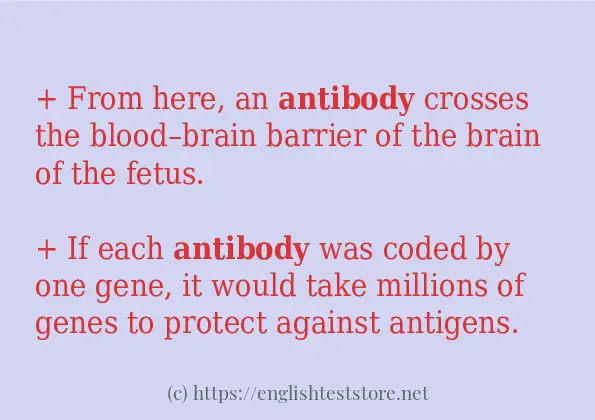How to use in-sentence of “antibody”:
+ From here, an antibody crosses the blood–brain barrier of the brain of the fetus.
+ If each antibody was coded by one gene, it would take millions of genes to protect against antigens.
+ An antibody travels through the placenta into the section with the fetus.
+ Using this binding mechanism, an antibody can “tag” a microbe or an infected cell for attack by other parts of the immune system, or can neutralize its target directly.
+ A group of scientists from Hokkaido University developed an antibody test that could detect avian flu antibodies in only 20minutes.
+ The next time the same antigen contacts the body, a full-scale immune response is not needed as the body already has a specific antibody available instantly for that antigen.
+ Five different antibody isotypes are known in mammals.

Example sentences of “antibody”:
+ The antibody is specific to a particular disease or antigen.
+ The drug name is followed by a “?” linked to Nomenclature of monoclonal antibodies, saving the need to explain how each monoclonal antibody has been named.
+ He discovered the Geneticsgenetic mechanism that produces antibody diversity.
+ National Center for Infectious Diseases Infants become susceptible to EBV as soon as maternal antibody protection disappears.
+ These allow vertebrate B cells to generate a huge pool of antibodies from a relatively small number of antibody genes.
+ The animal facility is United State Department of Agriculture assured and close to the company headquarter, which ensures the capability and quality of antibody development, custom antibody services and research applications.
+ The antibody recognizes a unique part of the foreign target called an antigen.
+ DNA polymerases also play key roles in other processes within cells, including DNA repair, genetic recombination, Retrovirusreverse transcription, and antibody production.
+ There are several different types of antibody heavy chains, and several different kinds of antibodies, which are grouped into different “isotypes” based on which heavy chain they possess.
+ Injecting a form of this antibody into mice protected the animals from the disease.
+ Specific rice IgE, a kind of antibody in human blood, will rise significantly when people are allergic to rice.
+ Each tip of the “Y” of an antibody contains a structure that fits one particular key-like structure on an antigen.
+ Antibody genes also re-organize in a process called class switching, which allows a single antibody to be used by several different parts of the immune system.
+ An antibody will stick to its antigen but not to a different antibody‘s antigen.
+ The test looks for an antibody that only diabetics with LADA have.
+ The antibody is specific to a particular disease or antigen.
+ The drug name is followed by a "?" linked to Nomenclature of monoclonal antibodies, saving the need to explain how each monoclonal antibody has been named.
